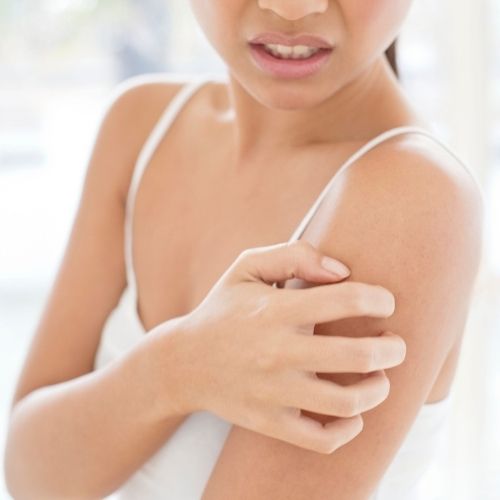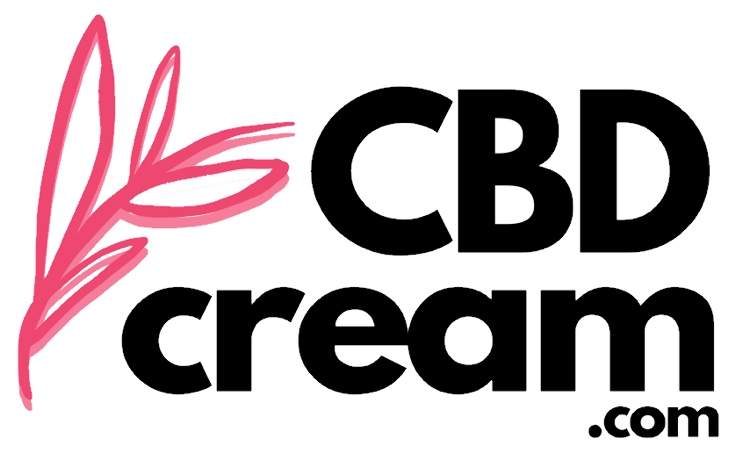Chances are excellent that if you’re reading this, dry, itchy skin makes you miserable at least some of the time. It is a truly miserable symptom, and one that is not always easy to treat.
There are lots of things that can cause dry, itchy skin, but some of the big ones are eczema or dermatitis, psoriasis, and just plain old pruritis or dry skin.
In this article, we’ll focus on what causes dry, itchy skin, why Cannabidiol (CBD) can soothe it, how to treat dry, itchy skin with topicals, and our advice on how to find the best CBD cream for dry, itchy skin and the skin conditions that cause it.
What Causes Eczema
Eczema can cause red, dry, flaky patches of skin that itch, and sometimes even blisters and sores, anywhere on the body. It is usually caused by various immune system triggers combined with genetic factors, so allergic reactions or contact with irritants can set it off or make it worse. The National Eczema Association reports that more than 30 million Americans cope with this skincare challenge.
People with eczema experience malfunctions with their skin barrier which cause microscopic cracks to develop in its outermost layer. This in turn dehydrates and inflames the skin.
Although people refer to “eczema” like it’s a single condition, dermatology research reveals that it is actually several different skin issues that together add up to irritation, inflammation, and many side effects: atopic dermatitis, common among people with hay fever and asthma; contact dermatitis, usually caused by allergies; dyshidrotic eczema, caused by stress and seasonal allergies; nummular eczema which can lead to infection; seborrheic dermatitis, usually caused by cold, dry weather and sometimes referred to as “winter itch”; and stasis dermatitis, typically on the legs, ankles and feet.
Remember, eczema cannot be passed on from person to person, although it looks contagious. Allergies and genetics are its major causes.
Although not every person with eczema has the same symptoms all of the time, there are some common symptoms for all forms of the disease:
- Dryness
- Itchy skin
- Blisters (filled with fluid) which may explode and crust over into scabs
- Irritation
- Inflammation
- Rough patches of scaly skin
- Redness
- Swelling
What Causes Psoriasis
Psoriasis is a chronic autoimmune disease, and people who have it experience flareups. Medications for psoriasis, many of them topical, are intended to reduce inflammation and soothe irritation from plaques of skin cells. They often help to some extent, but they don’t cure psoriasis.
Hormone fluctuations can intensify symptoms of psoriasis, so women are more likely to experience psoriasis overall as well as more serious symptoms. In fact, many women experience psoriasis during pregnancy and a flare following delivery. About 30 percent of people with psoriasis also experience psoriatic arthritis, which is caused by inflammation.
Many foods trigger symptoms of psoriasis and flare-ups in many people, such as processed or junk foods, red meat, eggs, dairy, tomatoes and other nightshades, citrus, or alcohol. Antioxidants can help fight inflammation and oxidative stress, so people with psoriasis benefit from consuming them. Omega-3 fatty acids may also reduce inflammation in the body. Other natural remedies for reducing inflammation include turmeric and other anti-inflammatory spices and oils such as olive and coconut—but most people with psoriasis can’t manage it with diet alone.
Signs and symptoms of psoriasis vary, but they usually include:
- Red patches of skin covered with thick, silvery scales
- Smaller spots of scaly skin
- Dry, cracked skin that itches and may bleed
- Itching, burning, or soreness
- Fingernails that are thick, pitted, or ridged
- Swollen, stiff joints
Patches of psoriasis can be tiny or cover huge portions of the body. Usually, the elbows, ankles, knees front and back, face, lower back, legs, scalp, palms, and soles of the feet are affected.
Most kinds of psoriasis flare up for a few weeks or months in cycles, and then subside or even go into remission.
There are multiple kinds of psoriasis, including: the common plaque psoriasis; erythrodermic psoriasis; nail psoriasis which can result in onycholysis; psoriatic arthritis which can cause permanent joint damage; the rare variety pustular psoriasis; and guttate psoriasis and inverse psoriasis, both which can be triggered by different types of infection.
Psoriasis is an immune system disorder that causes the skin to regenerate too rapidly, but scientists don’t know why this happens. Currently, experts believe genetics, environment, and specific triggers all play a part in psoriasis.
Common psoriasis triggers include:
- Skin injury, including a cut or scrape, a bug bite, or a burn or severe sunburn
- Stress
- Weather, especially conditions that are cold and dry
- Infections, either systemic, such as strep throat, or of the skin
- Rapid withdrawal of corticosteroids
- Heavy alcohol consumption
- Certain medications, including lithium, antimalarial drugs, and high blood pressure medications
- Smoke exposure from smoking, either firsthand or secondhand, and wildfires
According to the NIH, there are several risk factors for developing psoriasis: smoking, family history, and stress. Beyond psoriatic arthritis, complications from psoriasis include:
- Eye conditions, such as conjunctivitis, blepharitis, and uveitis
- Autoimmune disease, such as Crohn’s disease, celiac disease, and sclerosis
- Obesity
- Type 2 diabetes
- High blood pressure
- Cardiovascular disease
- Anxiety, depression, and other mental health issues
Challenges of Treating Eczema and Psoriasis with Topicals

Eczema makes the barrier of the skin unable to protect itself by maintaining moisture. This leaves it vulnerable to allergens, and any other stressors in the environment.
As for psoriasis, it often occurs in skin fold areas which are harder than average to treat with topicals. It also creates skin plaques that are very thick, and tough for topicals to penetrate. Topical treatments such as steroid creams are usually most effective for mild psoriasis or in conjunction with other treatments.
This means the best topical CBD creams and similar treatments for both conditions are thick to cling to the skin longer, and contain ingredients that moisturize and protect the skin.
Humectants such as glycerin and hyaluronic acid help add additional hydration. Other ingredients such as ceramides, colloidal oatmeal, and petrolatum and other occlusive ingredients help protect the skin from irritants, and reinforce the barrier, with the aim of preventing flareups.
Moisturizers that feel “greasier” due to more oil such as salves and balms often create a more effective barrier for irritants and escaping moisture, and are sometimes better for treating eczema.
High-quality, thicker emollient creams, too, contain significant amounts of oil to protect the skin and cling to it as well as seal in moisture. With any treatment for psoriasis or eczema, read the label carefully, as any stabilizers, preservatives, or scents can potentially be irritating to your skin.
If you have eczema, avoid ingredients that may trigger it, including exfoliating acids such as glycolic, lactic, and salicylic acids, jojoba, retinol, alcohols, and some essential oils and fragrances. These can irritate and dry the skin more. (On the other hand, salicylic acid is a great ingredient for psoriasis topicals.)
Zinc, argan oil, and shea butter are all useful topical ingredients for psoriasis as well. Medical additives such as benzocaine and hydrocortisone may also amp up a CBD topical for these patients. And try menthol carefully; some patients find it helps.
Neither eczema nor psoriasis seem to like tea tree oil, so avoid this in your CBD topicals if you have these issues. And avoid CBD lotions for eczema and psoriasis and opt for creams and heavier topicals instead. Lotions contain the least amount of oil, are primarily water, and evaporate fast, along with your skin’s existing moisture.
CBD and Skin Disease
Use of CBD helps skin diseases such as eczema and psoriasis for several reasons.
It’s safer over the long haul than steroids, anti-inflammatory pills, and antihistamines. Plus, CBD creams and other topicals, and to some extent things like CBD tinctures and CBD oil taken internally, can achieve many of the same treatment goals.
The goals for eczema treatment are to manage itching, prevent infections, and heal the skin barrier. The goals for psoriasis treatment are to decrease the redness and size of plaques, and reduce how scaly plaques are. And for both issues, the ongoing goal is to stop flare-ups.
There are no silver bullet treatment for either issue, but they share many tactics:
- Avoid triggers
- Change your products
- Reduce stress
- Reduce inflammation with a diet high in Omega 3 fatty acids
- Don’t smoke
- Avoid alcohol
Science proves that CBD has antipruritic, anti-inflammatory, and antimicrobial benefits. It can also help skin produce oil and relieve pain, helping treat symptoms of common skin conditions such as psoriasis, rosacea, and eczema.
The Cannabis Plant and Skin
Human skin produces cannabinoid receptors and endocannabinoids to bind with them naturally. These components make up the endocannabinoid system or ECS of the skin that may also be receptive to phytocannabinoids.
The now-famous health effects of CBD are really, in large part, the same health benefits that come from the whole spectrum of cannabinoids, terpenes, and other phytocompounds that go into full-spectrum CBD products. These occur naturally in the Cannabis sativa plant—which includes the hemp plant and all of its products, from CBD cream to hemp oil.
Anti-inflammatory Properties
Inflammation is an immune system response to infection or injury—the start of healing damaged tissue. However, an overreacting immune system causes excessive inflammation.
Cannabinoids such as tetrahydrocannabinol (THC) and CBD effectively treat inflammation, both as a symptom and as its own condition. CBD is known to reduce inflammation and reduce associated chronic pain. Most skin problems involve excessive inflammation, so CBD skincare products are a good option, and alternative to things like topical steroids.
Antipruritic Benefits
Cannabinoids and general balanced skin health are connected, because cannabinoids support skin homeostasis. Topical CBD has an anti-itch benefit that is powerful because cannabinoids inhibit itching signals by activating CB2 receptors on peripheral sensory nerve fibers, soothing itchy skin.
Antimicrobial Characteristics of Cannabinoids
Cannabinoids may treat eczema by managing Staphylococcus aureus colonization of damaged skin, a factor in atopic dermatitis and leading cause of skin infections according to the Association for Professionals in Infection Control and Epidemiology (APIC). CBD and other cannabinoids have antimicrobial properties that fight the strains of S aureus.
Helps Dry Skin
Over-moisturizing dry skin can eventually prevents it from producing its own oils naturally. CBD interacts with the sebaceous glands, which produce oil for the skin, to help regulate sebum production, rebalancing dry skin.
Pain Relief
CBD effectively treats even some kinds of severe pain. These benefits may extend to CBD topicals according to some evidence.
How to Choose a CBD Cream for Dry, Itchy Skin
Look for industrial hemp sourced in the United States. Most high-end CBD products are extracted from hemp sourced in Colorado and Kentucky.
Check for third-party lab testing results which should be available for every single batch. This ensures the CBD cream you’re getting is free of heavy metals, bacteria, toxins, pesticides, and everything else you don’t want.
You will find full-spectrum, broad-spectrum, and probably CBD isolate options. There is no reason you have to have one or the other for eczema or psoriasis in particular.
But most CBD topicals that work for these issues contain humectants like petroleum, mineral oil, glycerin, lanolin, and other rich moisturizing ingredients like hemp seed oil or coconut oil. Some include vitamin E, vitamin D, or vitamin A along with aloe vera and other natural ingredients, all of which are good for eczema and psoriasis.

For people who suffer for years on end with psoriasis and eczema, topical CBD products offer some relief. There’s no silver bullet cure here, as before, but another powerful tool in the toolbox.
[Disclaimer: None of this information has been evaluated by the Food and Drug Administration (FDA). Speak to a healthcare provider such as a dermatologist before starting any new treatment, including about possible risks and your existing medical conditions.]


